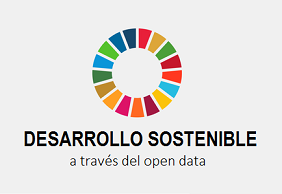Open data as an effective tool for sustainable development
Fecha de la noticia: 02-09-2016

In August 2014 the Secretary-General of the United Nations Ban Ki-moon asked a group of independent experts to develop specific recommendations on how to carry out a data revolution for sustainable development. In the conclusions of the report prepared by the experts, two global challenges were identified:
- The"invisibility" challenge due to the differences between what we could get to know if we had access to the appropriate data and what we really know given the current lack of data.
- The inequality challenge due to the differences between those who have access to the data that they need to make their own decisions and those who don´t.
Since this report was published, the use and potential of the data has begun to take a special role in the global agenda for sustainable development. Only one year later, the General Assembly of the United Nations adopted new and ambitious Sustainable Development Goals, 17 objectives in different policy areas which establish the development agenda for the coming years and include subjects such as poverty, hunger, health, education, gender equality, access to clean water, clean energy, employment, sustainable growth, industry, inequality, responsible consumption, climate change, ecosystem, peace and justice.
This time open data play again an important part in the debate on their role as a development tool, but with a more focused approach to monitoring the progress of the goals. Then there are several voices advocating a more intensive use of open data to promote the development. For example, the report “Open Data for Sustainable Development” by The World Bank also highlights what additional contributions the open data can make to achieve the development goals:
- Promote economic growth and job creation.
- Improve the efficiency and efficacy of public services.
- Promote transparency, accountability and participation of governments.
- Facilitate the information sharing among governmental agencies.
In the end, the role of open data will be critical in order to achieve the new development goals, on the one hand contributing to the definition of necessary data standards, also as a tool to measure the progress and accountability and finally providing the necessary evidence on the real impact obtained. One must ensure that the data revolution is open otherwise there will be no revolution.
To that end the OD4D (Open Data for Development) network, whose main purpose is to activate the potential of open data as a tool for development, contributing not only to the development of the global open data agenda, but also the regional agendas in Africa or Asia for example and also givingsupport to implement them. Thanks to the joint efforts of the network and other initiatives such as the International Open Data Charter, it has been possible to embed the open data principles within the development goals through the Open Data module for sustainable development.
Whether to improve the access to drinking water or the health system, analyze the effectiveness of education systems, promote gender equality, tackle climate change and preserve our forests, open data have been already proving all their potential as a development tool, but to get the most of them we also have to solve first a series of obstacles that hinder the access to the necessary data as the lack of a clear legal and regulatory framework; the new digital gap between rich and poor, both in the data supply and demand; the existence of an organizational culture in some governments that does not promote the openness or the lack of coordination between data supply and demand.











